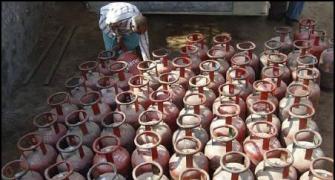As the government gets ready to float a separate company for developing an oil/gas block in Iran, it has started diplomatic talks with the US on the issue, to avoid Western sanctions.  The ministry of petroleum is tightlipped on the issue. Officials indicate the plan is to float a company and later acquire the asset when the ongoing sanctions on Iran are lifted. Three Indian state-sector companies had jointly won the block in 2002 from the National Iranian Oil Company. ONGC Videsh and Indian Oil corporation had 40 per cent of stake each; Oil India Litd had the remaining 20 per cent.
The ministry of petroleum is tightlipped on the issue. Officials indicate the plan is to float a company and later acquire the asset when the ongoing sanctions on Iran are lifted. Three Indian state-sector companies had jointly won the block in 2002 from the National Iranian Oil Company. ONGC Videsh and Indian Oil corporation had 40 per cent of stake each; Oil India Litd had the remaining 20 per cent.
The companies were delaying the signing of a production sharing contract (PSC) with the Iranian authorities due to the American and European Union sanctions, since doing so could invite sanctions on our companies. However, Iran is putting pressure to delay no more and India badly needs crude oil from there, more so as one can pay entirely in rupees, saving on needed dollars. Iran says if it is to supply oil and take payment entirely in rupees, it wants the PSC signed.
Petroleum minister M Veerappa Moily would like to import 11 million tonnes of Iranian crude in this financial year. At $105 a barrel, this would be worth $8.5
“Iran is taking a tough stance following the over-hyped plan. We are taking diplomatic channels to convince the US and Iran simultaneously,” said a senior official close to the development. India does not want to leave the block, since this has proven reserves of 12.5 trillion cubic feet of gas. More, Iran wants India to fast-track an earlier proposal to revamp its Chabahar port.
According to sources, Iran was reluctant to accept full rupee payment. India had hitherto paid for Iran’s oil through Turkish Halk Bank and our own UCO Bank, in a 55:45 ratio in dollar/rupee terms. Use of Iranian crude oil in Indian refineries came down in 2012-13 from 18.1 million tonnes the year before to 13.3 million tonnes, due to the sanctions.
Under a domestic law of late 2011, the US government can issue sanctions against any company that buys Iranian crude oil, later extended to any company involved in business with that country, because of which Turkish Halk Bank had refused to accept crude oil payments for Iran imports since February.









